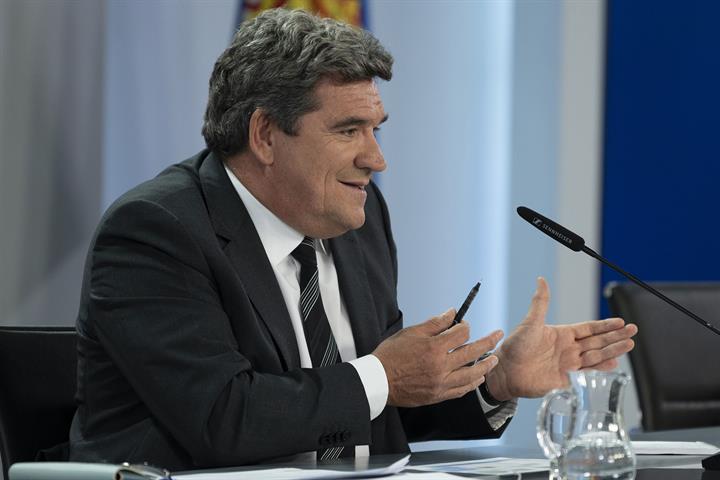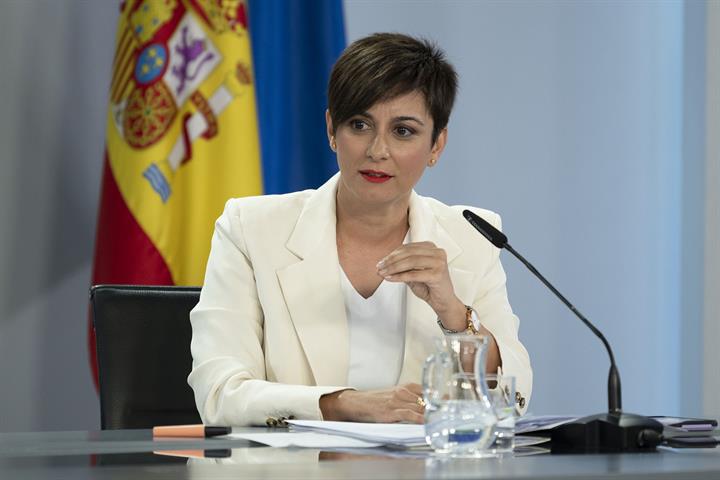Council of Ministers
Council of Ministers relaxes early retirement rules for people with disabilities and extends incentives for delayed retirement
Council of Ministers - 2023.5.16
Moncloa Palace, Madrid
The Council of Ministers has approved two royal decrees that make it easier for people with a disability of more than 45% to access early retirement and which complete the reform of incentives for delayed retirement, initiated in 2021, for all workers.
The Minister for Inclusion, Social Security and Migration, José Luis Escrivá, has stressed that these rules are the culmination of all the recommendations that the Toledo Pact presented to the Government in November 2020. During his speech, Escrivá highlighted the consensus and agreement reached in the approval of some of them, such as reducing the gender gap, maintaining the purchasing power of pensions, promoting employment plans and modifying the Social Security system for the self-employed.
Early retirement for people with disabilities
By means of the royal decree that improves access to early retirement on the grounds of disabilitythe Government reduces from 15 to 5 years, from the date of diagnosis, the contribution period required for workers with a disability of more than 45% to be able to access early retirement, with the requirement of having worked for an effective period of time equivalent to the minimum contribution period.
José Luis Escrivá also pointed out that it will be possible to combine two different types of pathologies to determine the 45% degree of disability and that both the accreditation and the updating of pathologies will be simplified. From now on, a medical report certifying that the person has suffered from one of the conditions required for early retirement will be sufficient.
More incentives for delayed retirement
 The Minister for Inclusion, Social Security and Migration, José Luis Escrivá, during his speech at the press conference after the Council of Ministers | Pool Moncloa/Borja Puig de la Bellacasa
The Minister for Inclusion, Social Security and Migration, José Luis Escrivá, during his speech at the press conference after the Council of Ministers | Pool Moncloa/Borja Puig de la Bellacasa
The Royal Decree on incentives for delayed retirement extends the options for those who wish to voluntarily prolong their working life, by means of a mixed formula that allows a combination of the two types of incentives currently in force: the possibility of receiving a single payment ("cheque") at the time of retirement and a percentage increase in their pension.
Those who opt for this new formula and delay their retirement between 2 and 10 years will simultaneously receive an increase in their pension of 2% for each year they delay it, and a lump-sum payment equivalent to half of what they would receive if they opted for the current lump-sum formula. If you delay retirement by 11 years or more, the incentive will be a lump sum payment applied to 5 years of the delayed period.
The minister pointed out that the incentives for delayed retirement is a voluntary measure that is allowing people who are in good health and want to prolong their working life to do so. They also help to reinforce the sustainability of the pension system. Escrivá pointed out that the activity rate of people between the ages of 60 and 69 is notably increasing.
Sustainability of the Pension System
The Council of Ministers also discussed a report on the pension system, which includes social security affiliation data for the first half of May. The data reflect the creation of 117,000 jobs, adding to those already created in the first four months of the year.
Escrivá pointed out that the number of jobs created is close to 100,000 per month and that the income received by Social Security is growing, making the sustainability of pensions "fully guaranteed and secure". Recruitment, he said, is increasing in all sectors, the Spanish economy is generating confidence and is competitive, and Spanish companies are performing extraordinarily well as exporters.
Encouraging cinema-going among the over-65s
 The Government Spokesperson and Minister for Territorial Policy, Isabel Rodríguez, during her speech at the press conference after the Council of Ministers | Pool Moncloa/Borja Puig de la Bellacasa
The Government Spokesperson and Minister for Territorial Policy, Isabel Rodríguez, during her speech at the press conference after the Council of Ministers | Pool Moncloa/Borja Puig de la Bellacasa
The Minister for Territorial Policy and Government Spokesperson, Isabel Rodríguez, has explained that the Council of Ministers has agreed to develop a public aid programme to encourage people over the age of 65 to go to the cinema.. The measure, she said, would benefit more than 9.5 million citizens, who would be able to go to the cinema for 2 euros one day a week. In principle, she clarified, this day would be Tuesday, but other days could be agreed upon, based on the characteristics of each territory.
Isabel Rodríguez said that, with this decision, the government wants to "promote and recover the cultural habits that were lost during the pandemic", to promote active ageing, and to support the cinema sector, which "has not recovered pre-pandemic levels of cinema attendance".
Theatres have lost 40% of the audience they had in 2019 and the over-65s are attending 60% less, the minister pointed out.
Institutional declaration
The spokesperson announced that the Executive has approved an institutional declaration to mark International Day against Homophobia, Transphobia and Biphobia, which is celebrated on 17 May.
The spokesperson pointed out that the Government reaffirms its commitment to real and effective equality for LGTBI people, both inside and outside Spain, and this will also be an issue during the Spanish Presidency of the Council of the European Union, which will begin on 1 June.
Cooperation Bodies Report
The Council of Ministers has analysed the results of a report on the activity of the various cooperation bodies during 2022.. According to the data gathered in this report, the level of collaboration between the General State Administration and the Autonomous Communities is maintained, with a total of 156 sectoral conference meetings in 2022, mainly focused on the expansion of the Recovery, Transformation and Resilience Plan.
The Minister for Territorial Policy stressed that another of the main issues addressed at the meetings was the outbreak of the war in Ukraine and its consequences, especially in the energy sector.
Infrastructure investment
The Executive has adopted the works for the third lane of the A-67 motorway between Polanco and Santander (172 million euros), the transformation of the Ourense intermodal station (130 million euros), the works on Avenida Alfonso Molina in A Coruña (18 million euros) and the works to improve energy efficiency at the Carboneras desalination plant in Almería (41 million euros).
Non official translation




